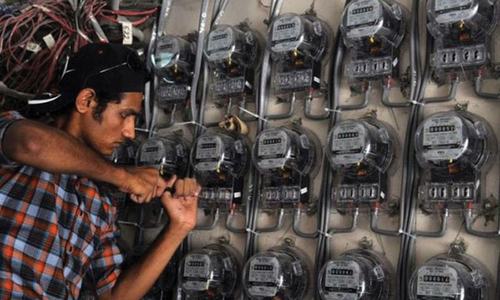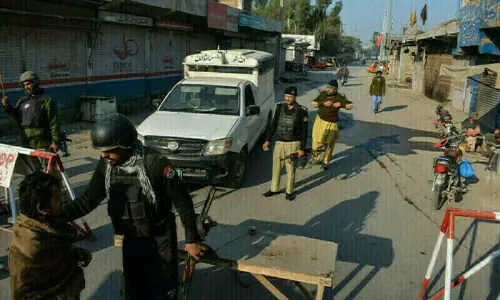ISLAMABAD: Soon after Prime Minister Nawaz Sharif’s meeting with a high-profile Chinese delegation, a special ministerial committee went into an emergency huddle to seek review of multi-year tariff announced by the power regulator for K-Electric (KE) to avoid flight of prospective Chinese investment.
The delegation led by Wang Binghua, chairman of State Power Investment Corporation of China — the parent company of KE’s new buyer Shanghai Electric — called on the prime minister on Wednesday.
“They (Chinese) told the prime minister that the tariff model announced early this week by the National Electric Power Regulatory Authority (Nepra) did not provide incentive for fresh investment and hence unacceptable,” a participant of the meeting told Dawn. “They think the new tariff model has evaporated profitability.”
Regulator earlier cut KE’s tariff by Rs3.50 per unit for seven years
The power regulator on Monday cut KE’s multi-year tariff by Rs3.50 per unit for the next seven years, transferred efficiency gains to consumers, allowed return on assets to the operator and provided for open-access to new electricity service providers. This entailed about Rs48 billion annual saving to consumers and the government through lower subsidy allocations.
The prime minister constituted a high-powered committee to look into the matter and settle in a manner that was conducive to fresh investment. The committee comprised Finance Minister Ishaq Dar, Planning Minister Ahsan Iqbal, Petroleum Minister Shahid Khaqan Abbasi, Water and Power Minister Khawaja Muhammad Asif and prime minister’s principal secretary Fawad Hassan Fawad.
The committee immediately gathered at the office of the power minister to deliberate on the issue. “Chinese investment could be at stake,” a cabinet member told Dawn after the meeting, saying the Shanghai Electric Power Company (SEP) was entering the power transmission and distribution system with a substantial investment.
The minister declined to comment if the committee had reached a conclusive decision, saying “review (of the Nepra decision) could be the possible option”. He also did not say if the government would seek review of the regulator’s decision or it would support the private entity to go for review or reconsideration application.
The Shanghai Electric, which entered into a $1.77 billion deal with Abraaj Group for KE’s 66.4pc majority takeover, previously told the federal government it planned $9 billion investment by 2030 for system upgrade and capacity addition in generation, transmission and distribution network.
It had reported that it will introduce technologies and equipment that help reduce transmission and distribution losses like it had done in Estonia — cutting system losses from 14pc to 9pc within a year. The introduction of remote technologies can eliminate the possibility of electricity theft through the so-called kunda system that was where the Chinese investor was banking its profitability model.
The government quarters are upbeat about the SEP’s entry into Pakistan’s energy market, seeing it as a long-term, non-divorceable relationship replacing a short-term transactional arrangement with Abraaj.
Off late, the settlement of dues payable by the Abraaj Group to Sui Southern Gas Company and electricity supplier Central Power Purchasing Agency / National Transmission and Despatch Company estimated cumulatively at around Rs138 billion and Abraaj’s counter claims were already appearing as a stumbling block. The initial clearance by the corporate watchdog for the share transfer has already expired a few days ago and the parties concerned had planned to seek an extension.
An official statement quoted the prime minister as saying that his government had given top priority to the power sector to help it meet industrial, commercial and domestic requirements because of shortages. He felicitated Mr Wang on the groundbreaking of 1,320-megawatt coal-based power project in Balochistan as a joint venture between the Chinese company with local partners Hub Power Company and the Balochistan government.
Mr Sharif said Pakistan provided a conducive business environment for foreign investment with its strategic location as Asia’s premier trade, energy and transport corridor with a huge consumer market. “China-Pakistan Economic Corridor is not only a framework of regional connectivity, but a journey towards economic regionalisation,” the premier said.
Nepra said early this week that K-Electric’s previous tariff, announced originally in 2002, became effective in 2009 due to delayed sale of Karachi’s integrated utility and then its resale to the Abraaj Group, and expired on June 30, 2016.
The new tariff would now become effective from the date of its notification by the federal government, legally required within 15 days unless challenged for review or reconsideration. It will remain effective until 2023.
The regulator said private operators had about 12 years to earn efficiency gains through reduction losses that were not shared with the consumers and hence the company had now become profitable. The time was therefore up for allowing return on assets like other companies. The KE management did not like the new structure and said it would go against the consumers.
Published in Dawn, March 23rd, 2017



































